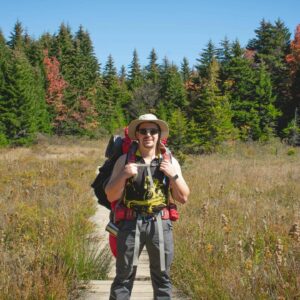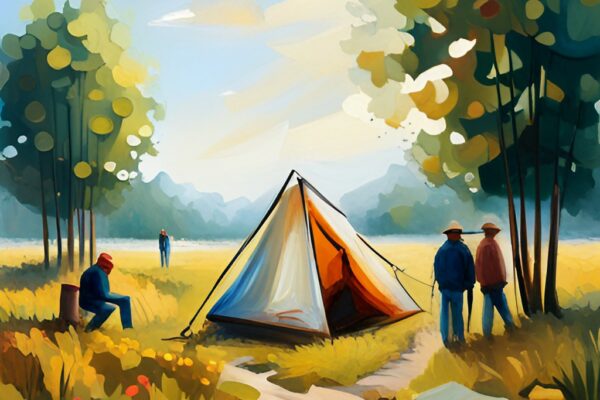
Are you feeling stressed out and overwhelmed? Have you considered going camping? Tent camping can be a great way to improve your mental health and well-being. Studies have shown that spending time in nature can reduce stress, anxiety, and depression.
In this blog, we’ll explore the mental health benefits of tent camping, who can benefit from it, and how to plan a trip that promotes mental wellness. We’ll also discuss specific camping activities that can improve mental health, build resilience and coping skills, foster a sense of community and social support, and reduce the symptoms of seasonal affective disorder (SAD).
Additionally, we’ll address some of the challenges of tent camping and provide tips on overcoming them for a positive mental health experience. So, grab your gear, and let’s explore the great outdoors!
- What Are the Mental Health Benefits of Tent Camping?
- Who Benefits From a Camping?
- How Does the Lack of Distractions in Nature Positively Impact Mental Health?
- What Are Some Specific Camping Activities That Can Improve Mental Health?
- What Are Some Tips for Planning a Tent Camping Trip That Promotes Mental Wellness?
- How Can Tent Camping Help in Building Resilience and Coping Skills?
- How Does Tent Camping Foster a Sense of Community and Social Support?
- How Can Tent Camping Help in Reducing the Symptoms of Seasonal Affective Disorder (SAD)?
- What Are Some of the Challenges of Tent Camping and How Can They Be Overcome for a Positive Mental Health Experience?
- The Benefits of Tent Camping for Mental Health – Frequently Asked Questions
- The Benefits of Tent Camping for Mental Health – Conclusion
- The Benefits of Tent Camping for Mental Health – Recommended Reading
What Are the Mental Health Benefits of Tent Camping?
Tent camping is a recreational and powerful tool for promoting mental health. Connecting with nature and disconnecting from the stressors of modern life can profoundly impact our well-being. Here are the mental health benefits of tent camping:
1. Stress Reduction- Mental Health Benefits of Tent Camping
Tent camping provides an escape from the daily grind, allowing individuals to disconnect from work, technology, and other stressors. Immersed in natural surroundings, campers experience a significant reduction in stress levels. Studies have shown that spending time in nature decreases cortisol, the stress hormone, leading to improved mental well-being.
2. Anxiety Relief- Mental Health Benefits of Tent Camping
Nature has a calming effect on the mind, and tent camping offers an ideal opportunity to immerse oneself in a peaceful environment. Breathing fresh air, surrounded by trees and open spaces, can help alleviate anxiety symptoms. Research indicates that exposure to green spaces reduces anxiety and improves overall mood.
3. Enhanced Sleep Quality- Mental Health Benefits of Tent Camping
Sleep plays a vital role in maintaining good mental health. Tent camping promotes healthy sleep patterns due to the absence of artificial lighting and exposure to natural sunlight during the day. The natural light-dark cycle helps regulate the body’s circadian rhythm, leading to better sleep quality and refreshed mornings.
4. Boosted Mood and Happiness- Mental Health Benefits of Tent Camping
Spending time in nature while tent camping has been linked to increased happiness and improved mood. Endorphins and serotonin, known as the “happy hormones,” are released more readily in natural environments. The beauty of nature and engaging in enjoyable activities like hiking or stargazing contribute to a positive state of mind.
5. Reduction of Depression Symptoms- Mental Health Benefits of Tent Camping
Tent camping offers a break from the monotony of everyday life, which can be particularly beneficial for individuals with depression. Nature’s tranquil and awe-inspiring surroundings of nature have been shown to reduce depressive symptoms and enhance overall well-being. Physical activities while camping also boost dopamine levels, improving motivation and happiness.
6. Digital Detox and Mental Clarity- Mental Health Benefits of Tent Camping
Modern life is saturated with digital technology, which can overwhelm and clutter the mind. Tent camping provides an opportunity to unplug and engage in a digital detox. This break from screens and constant connectivity allows the mind to recharge, enhancing mental clarity, focus, and concentration.
7. Social Connection and Support- Mental Health Benefits of Tent Camping
Tent camping can be a social activity, offering opportunities for bonding and connection with friends and family. Building and strengthening relationships, sharing experiences around the campfire, and engaging in group activities contribute to a sense of belonging and support. Social connection has been consistently linked to improved mental health outcomes.
8. Increased Resilience and Self-Reliance- Mental Health Benefits of Tent Camping
Tent camping fosters self-reliance and resilience as individuals navigate outdoor challenges and unfamiliar environments. Overcoming obstacles, setting up tents, building fires, and problem-solving in nature can boost confidence and self-esteem. These experiences translate into improved mental resilience, empowering individuals to face life’s challenges more easily.
Who Benefits From a Camping?
Camping is an outdoor activity that benefits individuals of all ages and backgrounds. Whether you’re a nature enthusiast, adventure seeker, or looking for a break from daily routines, camping provides many advantages. Here are the various groups of people who can benefit from camping.
1. Families – Who Benefits From Camping?
Camping provides an excellent opportunity for families to bond and create lasting memories. Away from the distractions of everyday life, families can engage in outdoor activities, such as hiking or fishing, promoting quality time and strengthening familial relationships. Camping also allows parents to teach children valuable life skills like teamwork, problem-solving, and self-reliance.
2. Children and Adolescents – Who Benefit From Camping?
For children and adolescents, camping offers a range of developmental benefits. It provides a break from technology and encourages physical activity, fostering healthy growth and development. Camping also enhances problem-solving abilities, boosts creativity, and nurtures a sense of independence and resilience. Exposure to nature promotes curiosity, environmental awareness, and a love for the outdoors.
3. Individuals Seeking Adventure – Who Benefits From Camping?
Adventure seekers find camping to be an ideal activity. It offers opportunities for thrilling experiences like hiking through challenging terrains, rock climbing, or white-water rafting. The adrenaline rush and sense of accomplishment from conquering outdoor challenges contribute to personal growth, self-confidence, and an enhanced zest for life.
4. Nature Enthusiasts – Who Benefits From Camping?
Camping is a haven for nature enthusiasts who appreciate the beauty and tranquility of the natural world. Immersing in nature provides peace, rejuvenation, and a deeper connection with the environment. It allows individuals to observe and learn about different ecosystems, wildlife, and plant species, fostering a greater appreciation for the Earth’s biodiversity.
5. Outdoor Recreation and Sports Enthusiasts – Who Benefits From Camping?
Camping is a gateway to a wide range of outdoor recreational activities. It is a basecamp for sports enthusiasts interested in mountain biking, kayaking, fishing, or birdwatching activities. These activities promote physical fitness, improve cardiovascular health, and increase overall well-being. Camping also offers convenient access to national parks, forests, and trails, providing endless opportunities for exploration and adventure.
6. Individuals Seeking Solitude and Reflection – Who Benefits From Camping?
Camping provides a serene environment for those seeking solitude and self-reflection. Away from the noise and distractions of urban life, campers can immerse themselves in nature and engage in mindfulness practices. This solitude fosters mental clarity, reduces stress, and promotes introspection, allowing individuals to reconnect with themselves and find inner peace.
7. People with Mental Health Concerns – Who Benefits From Camping?
Camping has proven therapeutic benefits for individuals with mental health concerns. Nature has a calming effect on the mind, reducing stress, anxiety, and symptoms of depression. The fresh air, exposure to natural light, and engaging in physical activities while camping release endorphins, promoting overall well-being. Furthermore, camping can provide a break from routine, allowing individuals to recharge and gain perspective.
8. Groups and Organizations – Who Benefits From Camping?
Camping is not only beneficial for individuals but also for groups and organizations. It serves as a platform for team-building activities, leadership development, and fostering camaraderie. Outdoor retreats and camping expeditions promote effective communication, problem-solving skills, and trust among group members, improving teamwork and productivity.
How Does the Lack of Distractions in Nature Positively Impact Mental Health?
Nature provides a serene environment free from the distractions of modern life. This lack of distractions allows individuals to experience a profound positive impact on their mental health. Here’s how the absence of distractions in nature positively affects mental well-being.
1. Reduced Mental Overload – How Does the Lack of Distractions in Nature Positively Impact Mental Health?
Our fast-paced, digitally connected world constantly bombards our minds with information and stimuli. This mental overload can increase stress, anxiety, and decreased mental clarity. Being in nature, away from the noise and distractions, provides a respite for our minds, allowing them to relax and rejuvenate.
2. Enhanced Focus and Concentration – How Does the Lack of Distractions in Nature Positively Impact Mental Health?
The lack of distractions in nature allows individuals to sharpen their focus and concentration. Individuals can engage in activities without constant interruptions from technology with undivided attention. This heightened focus improves productivity, performance, and the ability to complete tasks effectively.
3. Promotion of Mindfulness – How Does the Lack of Distractions in Nature Positively Impact Mental Health?
Nature provides an ideal setting for practicing mindfulness, the state of being fully present in the moment. When distractions are removed, individuals can immerse themselves in the natural environment’s sights, sounds, and sensations. This mindfulness practice promotes a sense of calm, reduces stress, and cultivates a greater appreciation for the present moment.
4. Improved Stress Management – How Does the Lack of Distractions in Nature Positively Impact Mental Health?
Distractions contribute to heightened stress levels as they divert our attention and prevent us from fully addressing stressors. Being in nature, away from these distractions, allows individuals to focus on stress management techniques such as deep breathing, meditation, and connecting with the natural world. This proactive approach to stress management leads to improved mental well-being.
5. Increased Self-Reflection and Introspection – How Does the Lack of Distractions in Nature Positively Impact Mental Health?
The absence of distractions in nature creates an opportunity for self-reflection and introspection. Individuals can turn inward and explore their thoughts, emotions, and personal experiences without external stimuli vying for attention. This reflective practice promotes self-awareness, personal growth, and a deeper self-understanding.
6. Restoration of Mental Energy – How Does the Lack of Distractions in Nature Positively Impact Mental Health?
Continuous exposure to distractions drains our mental energy reserves. With its simplicity and absence of technological interruptions, nature offers a therapeutic environment where mental energy can be replenished. Spending time in nature allows the mind to unwind, recharge, and regain vitality.
7. Promotion of Emotional Well-being – How Does the Lack of Distractions in Nature Positively Impact Mental Health?
The lack of distractions in nature fosters emotional well-being. It allows individuals to process and regulate their emotions without external influences. Nature’s tranquility and beauty can evoke positive emotions such as awe, joy, and gratitude, contributing to a positive overall emotional state.
8. Connection with the Present Moment – How Does the Lack of Distractions in Nature Positively Impact Mental Health?
Distractions often pull us away from the present moment, leading to feelings of detachment and disconnection. In nature, where distractions are minimized, individuals can fully connect with the present moment. This connection promotes a sense of grounding, inner peace, and an appreciation for the beauty of the natural world.
9. Increased Problem-solving Abilities – How Does the Lack of Distractions in Nature Positively Impact Mental Health?
The absence of natural distractions allows individuals to approach problem-solving tasks with greater clarity and creativity. The calmness and solitude of nature create a conducive environment for innovative thinking and alternative perspectives. This enhanced problem-solving ability boosts confidence, self-efficacy, and a sense of accomplishment.
10. Boosted Mood and Well-being – How Does the Lack of Distractions in Nature Positively Impact Mental Health?
Nature’s lack of distractions positively influences mood and overall well-being. Immersion in nature, free from the constant demands of technology, stimulates the release of endorphins and serotonin—neurotransmitters associated with happiness and well-being. This natural mood boost enhances mental health and promotes a positive outlook on life.
What Are Some Specific Camping Activities That Can Improve Mental Health?
Camping is not only a chance to reconnect with nature but also an opportunity to engage in specific activities that can significantly improve mental health. From physical exertion to creative outlets, camping offers various experiences promoting well-being. Here are some specific camping activities that have positive effects on mental health.
1. Hiking and Nature Walks – Specific Camping Activities That Can Improve Mental Health
Hiking and nature walk provide numerous mental health benefits. These activities promote physical exercise, which releases endorphins, improving mood and reducing stress levels. The peacefulness of the natural surroundings and physical movement enhances mindfulness, fosters relaxation, and increases overall well-being.
2. Campfire Meditation and Mindfulness Practices – Specific Camping Activities That Can Improve Mental Health
Sitting by the campfire and engaging in meditation or mindfulness practices can profoundly affect mental health. The calming crackle of the fire, coupled with the natural setting, creates an ideal atmosphere for deep relaxation and self-reflection. Campfire meditation allows individuals to focus their attention, cultivate mindfulness, reduce anxiety, and promote inner peace.
3. Stargazing – Specific Camping Activities That Can Improve Mental Health
Stargazing while camping offers a unique opportunity to contemplate the vastness of the universe and foster a sense of awe and wonder. Looking up at the night sky and observing the stars can be a mesmerizing and soothing experience. Stargazing encourages a sense of humility, perspective, and connectedness, promoting tranquility and improved mental well-being.
4. Creative Expression – Specific Camping Activities That Can Improve Mental Health
Camping provides a creative outlet that can enhance mental health. Engaging in activities such as painting, sketching, or photography allows individuals to connect with their artistic side while immersing themselves in the beauty of nature. Creative expression fosters self-expression, emotional release, and a sense of accomplishment, boosting self-esteem and overall mental well-being.
5. Journaling – Specific Camping Activities That Can Improve Mental Health
Journaling while camping can be a powerful tool for self-reflection and emotional processing. The serene environment encourages individuals to write about their thoughts, experiences, and emotions. Journaling promotes self-awareness, helps organize thoughts, and provides a safe space for expressing and understanding one’s feelings, improving mental clarity and emotional well-being.
6. Outdoor Yoga and Meditation – Specific Camping Activities That Can Improve Mental Health
Practicing yoga and meditation in an outdoor setting amplifies the benefits of these mindfulness practices. Camping allows individuals to connect with the natural elements while engaging in gentle movements and conscious breathing. Outdoor yoga and meditation promote relaxation, stress reduction, improved focus, and a deeper connection between the mind, body, and nature.
7. Fishing – Specific Camping Activities That Can Improve Mental Health
Fishing combines relaxation, concentration, and being in nature, offering numerous mental health benefits. The rhythmic and repetitive casting and reeling can induce a meditative state, reducing stress and promoting mindfulness. The peacefulness of the water and the anticipation of a catch can provide a sense of tranquility and a break from the pressures of daily life.
8. Nature Photography – Specific Camping Activities That Can Improve Mental Health
Engaging in nature photography while camping can boost mental well-being. It encourages individuals to slow down, observe their surroundings, and appreciate the beauty of nature from a unique perspective. Photography promotes mindfulness, creativity, and an appreciation for the details and intricacies of the natural world. It can also serve as a form of self-expression and a source of joy and inspiration.
10. Adventure Sports – Specific Camping Activities That Can Improve Mental Health
For those seeking an adrenaline rush, engaging in adventure sports while camping can have significant mental health benefits. Rock climbing, zip-lining, or kayaking challenge individuals physically and mentally. These experiences foster a sense of accomplishment, increased self-confidence, and the development of resilience, leading to improved mental well-being.
11. Socializing and Campfire Conversations – Specific Camping Activities That Can Improve Mental Health
Camping offers opportunities for socializing and engaging in meaningful conversations around the campfire. Connecting with others, sharing stories, and engaging in deep conversations can provide a sense of belonging, reduce loneliness, and promote emotional well-being. These interactions foster social support, create lasting memories, and improve mental health.
What Are Some Tips for Planning a Tent Camping Trip That Promotes Mental Wellness?
You can ensure a fulfilling and rejuvenating camping experience by considering certain factors and incorporating intentional practices. Here are some valuable tips for planning a tent camping trip promoting mental wellness.
1. Choose a Serene and Natural Location – Tips for Planning a Tent Camping Trip That Promotes Mental Wellness
Select a camping destination that offers a serene and natural environment. Look for campgrounds near forests, lakes, or mountains, as these settings provide a sense of tranquility and connection with nature. Avoid crowded and noisy locations to create a peaceful atmosphere conducive to mental wellness.
2. Research Campgrounds with Amenities – Tips for Planning a Tent Camping Trip That Promotes Mental Wellness
Consider campgrounds that offer amenities that align with your mental wellness goals. Look for features such as clean facilities, access to hiking trails, proximity to water bodies, or designated meditation areas. These amenities enhance your camping experience and provide relaxation, physical activity, and self-reflection opportunities.
3. Plan a Digital Detox – Tips for Planning a Tent Camping Trip That Promotes Mental Wellness
Commit to a digital detox during your camping trip to disconnect from technology and foster mental well-being. Inform family, friends, and colleagues about your intention to unplug and set clear boundaries. Turn off your devices or put them on airplane mode to minimize distractions and fully immerse yourself in the camping experience.
4. Pack Mindfulness Essentials – Tips for Planning a Tent Camping Trip That Promotes Mental Wellness
Bring items that support mindfulness practices and promote relaxation. Include a yoga mat or meditation cushion for outdoor mindfulness sessions. Pack a journal and pen for reflective writing, as well as books or inspirational readings. These essentials encourage self-reflection, introspection, and moments of calm during your camping trip.
5. Create a Flexible Itinerary – Tips for Planning a Tent Camping Trip That Promotes Mental Wellness
While planning your camping trip, create a flexible itinerary for spontaneity and relaxation. Avoid overbooking activities and leave room for leisurely exploration and downtime. Embrace the freedom to adapt your schedule based on your mood and energy levels, allowing for a stress-free and rejuvenating experience.
6. Prioritize Physical Activity – Tips for Planning a Tent Camping Trip That Promotes Mental Wellness
Incorporate physical activities into your camping trip that promote mental well-being. Plan hikes, nature walks, swimming, or cycling to engage in exercise while enjoying the natural surroundings. Physical activity releases endorphins, improves mood, reduces stress, and supports overall mental health.
7. Pack Healthy and Nourishing Food – Tips for Planning a Tent Camping Trip That Promotes Mental Wellness
Nutrition plays a crucial role in mental wellness. Prioritize packing healthy and nourishing food options for your camping trip. Include fresh fruits, vegetables, whole grains, and protein-rich snacks. Avoid excessive consumption of processed foods, sugary snacks, and alcohol, as they can negatively impact mood and energy levels.
8. Embrace Nature Connection Practices – Tips for Planning a Tent Camping Trip That Promotes Mental Wellness
Engage in activities that deepen your connection with nature. Practice forest bathing by immersing yourself in the natural surroundings and paying attention to the sounds, smells, and textures. Take time to observe wildlife, listen to bird songs, or appreciate the beauty of a sunrise or sunset. These practices enhance feelings of awe, gratitude, and well-being.
9. Incorporate Relaxation Techniques – Tips for Planning a Tent Camping Trip That Promotes Mental Wellness
Integrate relaxation techniques into your camping trip to reduce stress and promote mental wellness. Practice deep breathing exercises, guided meditation, or gentle yoga poses. Take moments to simply sit and observe the natural environment, allowing your mind and body to unwind and find peace in the present moment.
10. Foster Meaningful Connections – Tips for Planning a Tent Camping Trip That Promotes Mental Wellness
If camping with others, prioritize fostering meaningful connections and nurturing relationships. Engage in open and honest conversations, share stories, and listen actively. Foster a supportive, non-judgmental environment that promotes connection, belonging, and emotional well-being.
How Can Tent Camping Help in Building Resilience and Coping Skills?
Tent camping offers a unique opportunity to build resilience and develop coping skills in the face of challenges. Immersing oneself outdoors, away from the comforts and conveniences of everyday life, presents situations that require adaptability, problem-solving, and emotional strength. Here’s how tent camping can help in building resilience and coping skills.
1. Embracing Uncertainty – Building Resilience and Coping Skills
Tent camping introduces an element of uncertainty as individuals navigate unpredictable weather conditions, wildlife encounters, and unfamiliar surroundings. Campers learn to adapt to unexpected circumstances by embracing tension, fostering resilience, and remaining calm in the face of the unknown.
2. Problem-Solving – Building Resilience and Coping Skills
Camping often presents challenges, such as setting up a tent, building a fire, or preparing meals with limited resources. These situations require problem-solving skills, resourcefulness, and the ability to think creatively. Overcoming camping-related obstacles builds confidence, self-efficacy, and resilience in handling challenges beyond the camping experience.
3. Self-Reliance – Building Resilience and Coping Skills
Tent camping encourages self-reliance as individuals take responsibility for their basic needs. Setting up camp, cooking meals, and navigating the outdoors foster independence and self-sufficiency. Campers develop a sense of empowerment and adaptability by relying on their abilities, enhancing their resilience in various situations.
4. Managing Discomfort – Building Resilience and Coping Skills
Camping involves embracing physical discomfort, such as sleeping on the ground, dealing with temperature changes, or adapting to outdoor elements. Managing and tolerating discomfort builds resilience by developing endurance, perseverance, and adapting to adverse conditions.
5. Building Confidence – Building Resilience and Coping Skills
Overcoming challenges and successfully navigating the camping experience can significantly boost confidence. From conquering a tough hike to lighting a campfire, each accomplishment reinforces self-belief and the knowledge that one can overcome obstacles. Increased confidence acquired through camping transfers to other aspects of life, enhancing overall resilience.
6. Developing Emotional Resilience – Building Resilience and Coping Skills
Camping can evoke many emotions, including excitement, awe, frustration, or fear. These emotional experiences provide an opportunity to develop emotional resilience. Campers learn to recognize and regulate their emotions, adapt to new situations, and cultivate a positive mindset in the face of adversity.
7. Practicing Stress Management – Building Resilience and Coping Skills
Tent camping serves as a natural stress management training ground. Being in nature, surrounded by greenery and fresh air, reduces stress and promotes relaxation. Campers can practice stress management techniques such as mindfulness, deep breathing, and connecting with the natural environment. These skills translate into everyday life, enabling better stress management and coping strategies.
8. Encouraging Flexibility and Adaptability – Building Resilience and Coping Skills
Camping requires flexibility and adaptability, as plans may change due to weather conditions or unforeseen circumstances. Embracing these changes and adjusting expectations fosters adaptability, open-mindedness, and the ability to go with the flow. Developing these traits strengthens resilience and the capacity to cope with unexpected challenges in various contexts.
9. Connecting with Nature’s Rhythms – Building Resilience and Coping Skills
Camping allows individuals to synchronize their daily rhythms with nature. Waking up with the sunrise, following natural light patterns, and aligning activities with daylight promote a sense of harmony and connection. This connection with nature’s rhythms enhances resilience by fostering a balanced lifestyle and attunement to natural cycles.
10. Encountering Personal Reflection – Building Resilience and Coping Skills
Tent camping provides solitude and introspection, facilitating personal reflection. Time spent alone in nature encourages introspection, self-awareness, and self-discovery. Campers can reflect on their strengths, values, and goals, gaining insights that contribute to personal growth, resilience, and the development of coping skills.
How Does Tent Camping Foster a Sense of Community and Social Support?
Tent camping provides an excellent opportunity to foster a sense of community and social support, enabling individuals to connect with others in a unique and meaningful way. The shared experiences, camaraderie, and collaborative environment of camping contribute to building relationships and creating a sense of belonging. Here’s how tent camping fosters a sense of community and social support.
1. Campground Atmosphere – How Does Tent Camping Foster a Sense of Community and Social Support?
Campgrounds often have a friendly and welcoming atmosphere that encourages social interactions. The shared spaces, such as communal cooking areas or campfire circles, create opportunities for campers to connect, exchange stories, and form friendships. The informal and relaxed camping environment facilitates community among fellow campers.
2. Shared Recreational Activities – How Does Tent Camping Foster a Sense of Community and Social Support?
Tent camping offers various recreational activities that encourage social engagement. Whether hiking, fishing, or playing games, these activities unite campers, fostering camaraderie and shared enjoyment. Participating in group activities strengthens social bonds, promotes teamwork, and enhances the sense of community.
3. Collaborative Camping Tasks – How Does Tent Camping Foster a Sense of Community and Social Support?
Camping involves collaborative tasks such as setting tents, gathering firewood, or preparing meals. Engaging in these activities as a group promotes teamwork, cooperation, and mutual support. Campers often assist one another, share resources, and work together, creating a sense of community through shared responsibilities.
4. Campfire Conversations – How Does Tent Camping Foster a Sense of Community and Social Support?
Gathering around a campfire is a cherished camping tradition encourages conversations and storytelling. Campfire conversations provide an intimate, relaxed setting where campers can share their experiences, thoughts, and ideas. This fosters deep connections, encourages empathy, and creates a supportive environment where individuals feel heard and understood.
5. Building Lasting Friendships – How Does Tent Camping Foster a Sense of Community and Social Support?
Tent camping often leads to the formation of lasting friendships. The shared experiences and time spent together in nature create a strong bond among campers. From sharing meals to exploring the outdoors, these activities facilitate connections extending beyond the camping trip, providing long-term social support.
6. Multigenerational Connections – How Does Tent Camping Foster a Sense of Community and Social Support?
Camping brings people of different ages together, allowing for intergenerational connections. Families, friends, and individuals from various age groups come together in the camping environment, fostering opportunities for learning, mentorship, and exchanging experiences. These multigenerational connections strengthen the sense of community and provide diverse perspectives.
7. Supportive Camping Networks – How Does Tent Camping Foster a Sense of Community and Social Support?
Camping communities often develop supportive networks where experienced campers offer guidance and assistance to newcomers. These networks provide valuable knowledge, advice, and resources, creating a sense of support and mentorship within the camping community. New campers feel welcomed and supported, enhancing their overall camping experience.
8. Group Camping Trips – How Does Tent Camping Foster a Sense of Community and Social Support?
Organizing group camping trips with friends, colleagues, or community members strengthens social connections and promotes a sense of community. Group camping allows for shared responsibilities, collaborative decision-making, and the opportunity to create lasting memories together. These group experiences foster a sense of belonging and social support.
9. Cultural Exchange – How Does Tent Camping Foster a Sense of Community and Social Support?
Camping provides opportunities for cultural exchange as individuals from different backgrounds and cultures come together in a shared outdoor setting. Campers can learn about each other’s traditions, customs, and perspectives, fostering cross-cultural understanding and appreciation. This cultural exchange enriches the camping experience, promoting inclusivity and a sense of global community.
10. Support During Challenges – How Does Tent Camping Foster a Sense of Community and Social Support?
Tent camping often presents challenges like inclement weather, equipment failures, or navigation difficulties. Campers often come together to provide support, assistance, and problem-solving. The collective effort in overcoming challenges strengthens social bonds, reinforces a sense of community, and offers emotional and practical support.
How Can Tent Camping Help in Reducing the Symptoms of Seasonal Affective Disorder (SAD)?
Tent camping can be beneficial in reducing the symptoms of Seasonal Affective Disorder (SAD), a type of depression that typically occurs during the winter months. The outdoor environment and exposure to natural light while camping can positively impact mood and overall well-being. Sunlight is a natural source of vitamin D, and spending time outdoors allows individuals to absorb this essential vitamin, which has been linked to improved mood and reduced symptoms of depression.
Additionally, camping provides an opportunity for physical activity, such as hiking or nature walks, which can increase endorphin levels and boost mood. Changing scenery and connection with nature can also enhance relaxation, calmness, and rejuvenation. Camping allows individuals to break away from the monotony and isolation often accompanying the winter season, providing a sense of adventure, novelty, and social connection.
Whether gathering around a campfire, engaging in group activities, or simply enjoying the peacefulness of the natural surroundings, the social interactions and sense of community fostered during camping can contribute to improved mental well-being.
Furthermore, camping encourages individuals to unplug from technology and reduce exposure to artificial light, disrupting sleep patterns and exacerbating SAD symptoms. Campers can establish a healthier sleep routine and promote better sleep quality by disconnecting from electronic devices and embracing the natural rhythms of daylight and darkness.
What Are Some of the Challenges of Tent Camping and How Can They Be Overcome for a Positive Mental Health Experience?
Acknowledging and addressing potential challenges that can arise during camping trips is important. By understanding these challenges and implementing strategies to overcome them, campers can ensure a positive mental health experience. In this article, we will explore some common challenges of tent camping and provide solutions to overcome them.
1. Inclement Weather – Challenges of Tent Camping
Challenge: Unpredictable weather conditions, such as rain, storms, or extreme temperatures, can impact the camping experience and mood.
Solution: Check weather forecasts in advance and pack appropriate clothing and gear. Be prepared with waterproof tents, tarps, and extra layers to stay dry and warm. Embrace the opportunity to adapt plans, engage in indoor activities, or enjoy the unique beauty of nature during different weather conditions.
2. Lack of Comfort – Challenges of Tent Camping
Challenge: Sleeping on the ground, with limited amenities and basic facilities, can lead to discomfort and impact sleep quality.
Solution: Invest in high-quality camping gear, including sleeping pads or air mattresses, cozy sleeping bags, and comfortable camping chairs. Set up camp in level areas and clear the ground of rocks or debris. Bring comfort items, such as pillows, blankets, or camping hammocks. Prioritize rest, allowing the body to recharge and promoting positive mental health.
3. Bugs and Insects – Challenges of Tent Camping
Challenge: Mosquitoes, flies, and other insects can be bothersome and affect enjoyment during camping trips.
Solution: Pack insect repellent, citronella candles, or bug spray to deter insects. Wear appropriate clothing, such as long sleeves and pants, to minimize exposure. Set up mosquito netting around tents or camping areas for added protection. Embrace the natural environment while being mindful of insect precautions, ensuring a more pleasant camping experience.
4. Limited Access to Amenities – Challenges of Tent Camping
Challenge: Camping may involve limited access to amenities like showers, toilets, or running water, which can be challenging for some individuals.
Solution: Plan and research campgrounds that offer adequate amenities. Consider portable camping showers or water filtration systems to ensure access to clean water. Embrace the simplicity and natural aspects of camping, focusing on the unique experience and the opportunity to disconnect from modern conveniences.
5. Campsite Availability – Challenges of Tent Camping
Challenge: Finding available campsites, especially during peak seasons or popular destinations, can be challenging.
Solution: Make reservations well in advance to secure desired campsites. Consider alternative or lesser-known camping locations to avoid overcrowding. Plan camping trips during weekdays or off-peak seasons to secure campsites better. Flexibility and early planning can help overcome campsite availability challenges.
6. Campfire Restrictions – Challenges of Tent Camping
Challenge: Some campgrounds may impose restrictions or bans on campfires due to fire hazards or environmental regulations.
Solution: Check campsite regulations before the trip to understand fire restrictions. If campfires are not allowed, embrace alternative outdoor cooking or gathering methods, such as camping stoves or portable grills. Focus on other aspects of camping, such as stargazing, storytelling, or engaging in group activities to foster connection and enjoyment.
7. Lack of Privacy – Challenges of Tent Camping
Challenge: Campgrounds can be crowded, leading to some campers’ lack of privacy and solitude.
Solution: Research and select campgrounds with designated secluded or private campsites. Consider camping in less popular or remote areas for a quieter experience. Set camp away from high-traffic areas and use natural barriers like trees or bushes to create a sense of privacy. Embrace the opportunity to connect with others and create a sense of community while respecting personal boundaries.
8. Navigation and Safety Concerns – Challenges of Tent Camping
Challenge: Navigating unfamiliar terrain or encountering potential safety hazards can be daunting for some campers.
Solution: Prioritize safety by researching the campground, studying maps, and familiarizing yourself with the area before the trip. Carry navigation tools like compasses or GPS devices and learn basic orienteering skills. Follow trail markers and stay on designated paths to avoid getting lost. Communicate your plans with others and consider camping with a group for added safety and support.
9. Food Storage and Wildlife – Challenges of Tent Camping
Challenge: Properly storing food and disposing of waste to avoid wildlife encounters can be a concern.
Solution: Follow campground guidelines on food storage, using bear-resistant containers or hanging food from trees when required. Keep campsites clean and dispose of waste in designated containers. Minimize food odors by sealing containers tightly. Educate yourself on wildlife behavior and be prepared to safely and responsibly interact with wildlife if encounters occur.
10. Connectivity and Unplugging – Challenges of Tent Camping
Challenge: Limited or no access to cell phone service and the internet can be challenging for individuals accustomed to constant connectivity.
Solution: Embrace the opportunity to unplug and disconnect from technology. Use this time to engage in outdoor activities, connect with nature, and enjoy face-to-face interactions with fellow campers. Prioritize mindfulness and being present in the camping experience, allowing for a deeper connection with oneself and the surrounding environment.
The Benefits of Tent Camping for Mental Health – Frequently Asked Questions
Do You Think Camping Is a Good Activity?
Camping is a fantastic activity that offers numerous benefits and appeals to a wide range of people. It provides a refreshing break from the hustle and bustle of daily life, allowing individuals to connect with nature and disconnect from technology. The opportunity to spend time outdoors in serene surroundings is rejuvenating and promotes mental and physical well-being.
What Personal Traits Can Be Developed in Camping?
Camping offers an ideal setting for developing various personal traits and skills. Firstly, resilience is fostered as individuals encounter and overcome challenges such as adverse weather conditions or unfamiliar environments.
Problem-solving skills are honed as campers find creative solutions to tasks like setting up tents or starting fires. Self-sufficiency is cultivated through cooking meals or navigating without modern technology. Camping encourages adaptability as individuals adjust to different situations and embrace change.
Finally, teamwork and communication skills are enhanced through shared responsibilities and collaborative decision-making. Overall, camping offers a unique opportunity for personal growth and developing diverse traits.
What Are the Most Important Things to Bring In Camping?
When going camping, several essential items should not be overlooked. Firstly, a reliable tent is crucial to provide shelter and protection from the elements. A sleeping bag and pad or air mattress are essential for a comfortable night’s sleep.
Adequate clothing suitable for the expected weather conditions is necessary, including warm layers, rain gear, and sturdy footwear. Essential camping gear includes a stove or portable cooking grill, water filter or purification tablets, flashlight or headlamp, and a multi-tool for various tasks. Packing enough food, water, and necessary cooking utensils is also essential. Lastly, a first aid kit and a map or compass are necessary for safety and navigation.
The Benefits of Tent Camping for Mental Health – Conclusion
In conclusion, tent camping can be an effective way to improve your mental health and well-being. Being in nature can reduce stress and anxiety, improve mood, and promote relaxation. Additionally, camping provides opportunities to engage in activities that boost mental health, such as hiking, fishing, and campfire conversations with friends and family.
By planning a camping trip that promotes mental wellness and resilience, you can reap the benefits of being in nature and build skills that can help you in all areas of life.
Whether you’re a seasoned camper or a first-timer, there’s never been a better time to experience the mental health benefits of tent camping. So why not grab your tent, sleeping bag, and a few friends and head out into the great outdoors? Your mental health will thank you.
The Benefits of Tent Camping for Mental Health – Recommended Reading
10 Delicious and Easy Vegan Camping Meals to Satisfy Your Outdoor Appetite














